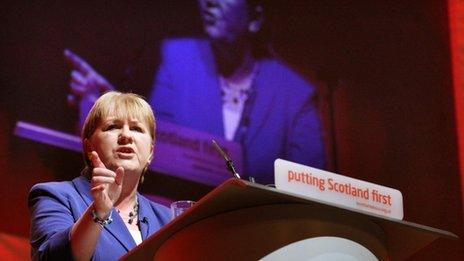Planning for the future
- Published

Johann Lamont has signalled a policy shift
The self-image, I suppose, is "Honest Johann". At one and the same time, she is setting out to engage with what she would depict as harsh, contemporary reality - but also, intriguingly, to disengage from elements of contemporary debate.
Already Johann Lamont has shown her desire to take charge of her party through senior staff departures, voluntary or otherwise.
Now the Scottish Labour leader is setting out her policy prospectus. Not in detail - for that, we await an election manifesto - but in outline.
In summary, she questions whether Scotland can continue to afford policies such as free personal care, free prescriptions, free university tuition and a continuing freeze on council tax.
She has, in truth, indicated much of this previously. For example, in a pre-conference webcast with me she caused controversy by pondering aloud whether students/graduates could be permanently protected from making a cash contribution.
But, by drawing the elements together, Ms Lamont plainly invites voters to infer a wider political lesson. In Holyrood, she has repeatedly sought to caricature Alex Salmond as shifty. Now she seeks to offer herself as the counterbalance.
More than that, as noted above, she is seeking to disengage with the terms of debate as set out by Scotland's party of devolved governance, the SNP.
Specifically, she is seeking once more to suggest that the referendum issue is a distracting irrelevance. The Nationalist counterpoint is that it is only with constitutional change that Scotland would gain the power to effect social and economic change.
Easy to meet
More than that, though, she argues that contemporary governance has become driven by targets which, she argues, are often bogus. She cites, as example, apprenticeships which she claims are often existing jobs dressed up as training to meet a central objective.

Ms Lamont has questioned the blanket policy of free personal care for the elderly
She calls for a "new accountability" in public service delivery, devolved to the front line. However, one can see obvious problems with this.
Firstly, opponents will simply say that Labour is not withdrawing from targets - just setting targets which are easier to meet. Secondly, how are we to measure outcomes in return for investment if not by targets? To be fair, Ms Lamont acknowledges that central government, which provides the funds, cannot withdraw from taking an interest in outcomes.
So what would be done? If there is to be less emphasis on, say, targets for nurse or police numbers, what do we measure? Some form of nebulous public satisfaction? The number of operations/arrests? Nothing?
This is a substantive practical and philosophical debate. And there are ideological debates to be had about each of the other issues she addresses.
Many of her Labour colleagues have long questioned the value of Free Personal Care for the elderly, noting that, by definition, it benefits the relatively affluent (I stress, relatively) who would not otherwise receive support.
Against that, it can be argued that it is only by providing a universal service that one obviates problems posed by those who are reluctant to claim and those who distrust means testing. Such was the basis for earlier provision such as child benefit.
Tax powers
Ditto free prescriptions. Council tax is a rather different question. Scottish Labour has, frankly, vacillated over a prolonged period with regard to the overall method and structure of local government finance.
Equally, Ms Lamont is right to point out that the SNP promised a Local Income Tax - only for that to slip into the background for a range of stated reasons.
Politicians are understandably leery of altering local revenue raising. They remember the Poll Tax - and they also know that local taxation raises a relatively low proportion of council funding but provokes a huge degree of voter ire. Gearing means that any small change in the system can result in a big increase in bills.
Again, though, is a freeze sustainable in the short term? The longer term? For ever? No. However, Ms Lamont is not yet saying what Labour would do more generally about local financing. Nor indeed about potential use of Holyrood's enhanced tax powers.
To be fair, again, we are some way off from the next Scottish Parliamentary election. At this stage, Ms Lamont is simply questioning the existing orthodoxy. At the very least, it should add to the sources of innocent merriment already available to the observing citizenry.
ADD......
Here at Holyrood, the Garden Lobby chat is predominantly about Johann Lamont's speech. Among those, that is, who are not utterly engrossed by tonight's contest between the mighty United and the recently mighty Queen of the South.
Reaction varies. In Labour ranks, the response ranges from confident to stoical. But there is undisguised glee among Nationalists.
Now, we may discount some of said glee - they are scarcely in the business of talking up an opponent. But the joy is bountiful and appears to be genuine.
I talked to several, including three Cabinet Ministers. One commented: "Christmas come early."
Another chortled long and loud before offering an analysis. And a third described Ms Lamont's speech as "the second longest suicide note in history."
(Actually, I believe that last comment may have been borrowed from an esteemed journalist. The gag borrows from Gerald Kaufman's description of Michael Foot's Labour manifesto in 1983. I recall attending the launch: how time flies.)
Anyway, the SNP calculation is that Ms Lamont and Labour will now be hampered for an extended period while their policy commission studies options. They will be able, say the SNP, to state what they are against - not what they are for.
And what they are potentially against, again say Nationalists, are some of the most popular and positive policies in Scotland.
Come the referendum, again say Nationalists, it will be SNP leaders who are offering the certainty of continuing social democratic policies - while simultaneously decrying the absence of certainty and a perceived "threat" from the other side.
The Labour view in the Garden Lobby? That people are sick and fed up of politicians promising goodies - with no discernible source of funding. That people will welcome honesty in politics.
And, more particularly, that Labour will now have a critique with which to attack the SNP - upon which they can build a succession of alternatives. For example, council jobs rather than a council tax freeze.
Told you it was fun.
- Published3 March 2012

- Published25 January 2012